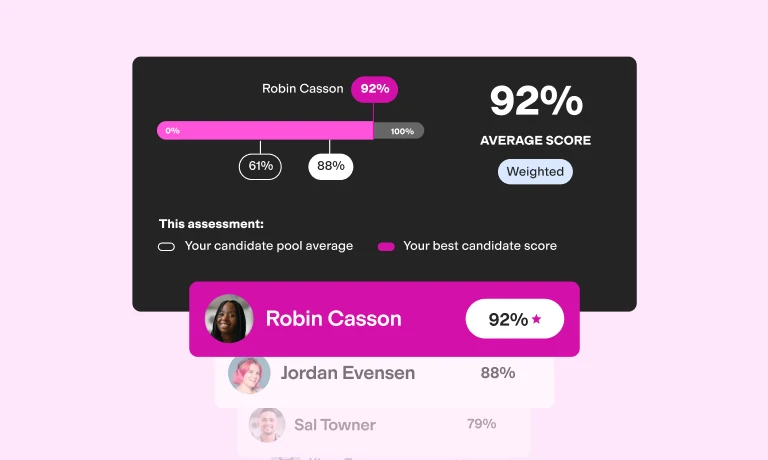Employers often focus so much on hiring people with the right technical skills that they forget it’s not all it takes to succeed at work.
Imagine bringing on a highly qualified accountant or developer who looks great on paper but turns out to be passive, disengaged, or disregards company values. You’re back to square one – looking for someone else and training them from scratch.
The good news? You can avoid these issues by finding candidates with a strong behavioral competency profile, displaying traits like conscientiousness in their day-to-day work. In this article, we’ll explain what conscientiousness is, why it matters, and how to test candidates so you can hire only the best talent for your company.
What is conscientiousness?
Conscientiousness is one of the five core behavioral traits in the Big Five personality model, a widely used framework in psychology that helps to break down people’s personality types and attributes.
This trait is all about how responsible, organized, and hardworking someone is. Someone highly conscientious tends to care about doing things well and in the right way, follow through on their commitments, and be a dependable team member.
Here are the key subtraits and attributes that make up conscientiousness:
Dutifulness: Taking rules and responsibilities seriously
Organization: Keeping tasks, routines, and physical and digital spaces neat and in order
Diligence: Working hard and putting in consistent effort at all times
Reliability: Can be counted on for showing up and following through to meet expectations, no matter what
Self-discipline: Staying focused and sticking to commitments even when things are challenging or boring
Attention to detail: Avoiding careless mistakes and noticing small things that others might miss
Cautiousness: Weighs options and thinks carefully before rushing into things
Examples of conscientiousness in the workplace
Here’s how conscientiousness shows up in a work context:
Completing tasks proactively instead of leaving things to the last minute
Meeting deadlines without needing reminders
Following instructions carefully, even for routine tasks
Double-checking work to catch errors before submitting or sharing
Always showing up on time and prepared
Communicating meticulously to prevent misunderstandings
Asking clarifying questions instead of relying on guesswork
Thinking through things carefully and avoiding impulsive decisions
While these everyday habits seem simple, they’re not common. One study showed that most people tend to believe they’re conscientious, but Gallup’s latest State of the Global Workplace report has shown that only about 21% of employees are actively engaged at work (a factor closely linked to conscientiousness).
Why conscientiousness matters in the workplace
Here’s why conscientiousness is important in a workplace.
Boosts job performance
Conscientious employees are dependable, organized, and goal-oriented, making them more likely to be productive at work. A vast body of literature supports the role of conscientiousness in work and academic performance.
One study found that among the Big Five traits, conscientiousness had a predictable and consistent positive association with task performance. Another study of 260 frontline technical workers even found that conscientiousness had a positive association with employees’ creativity, which helps companies stand out in a crowded and competitive market.
Improves employee engagement
Conscientious employees aren’t just clocking in and out of work or coffee badging. They take care about doing a good job and show up consistently regardless of whether work has been challenging, changing, or boring. A survey of nearly 400 employees found conscientious staff are more likely to be present (even when they’re not feeling like it) and engaged at work.
Increases trust and empowerment
When employees are conscientious, their managers and colleagues can count on them to follow through on commitments, meet deadlines, and produce high-quality work. This not only builds trust, but it also lets managers delegate tasks and empower their team members without having to babysit them or micromanage their work.
Enhances job satisfaction
Based on a survey of 223 full-time employees, one study found that conscientiousness promoted job satisfaction because conscientious workers who show up and work hard tend to thrive at work. In fact, the effect was strong even when individuals received less supervisor support, implying that self-discipline and self-starter qualities contribute to feelings of satisfaction in a role.
The best insights on HR and recruitment, delivered to your inbox.
Biweekly updates. No spam. Unsubscribe any time.
When conscientiousness is especially important
While conscientiousness is valuable in any job, it’s non-negotiable in certain work settings and roles. Here’s where this trait can make or break success.
High-stakes jobs and sectors
In industries like healthcare, aviation, finance, and accounting, the smallest errors can lead to major consequences. Jobs in these industries demand extra attention to detail, crystal-clear communication, and high levels of dutifulness.
Leadership positions
Leaders set the tone for a company’s culture, and employees tend to emulate leaders’ behaviors. Having leaders who show up prepared, stick to their promises, and lead by example can build trust and keep teams driven, while someone who lacks these dimensions of conscientiousness could promote poor workplace behaviors and practices.
Remote or hybrid work environments
One of the big reasons employers struggle with hybrid and remote working is that they worry employees will be less productive, or even cut corners, outside of an office setting. Conscientious employees can alleviate these concerns because they showcase self-discipline, a proactive work ethic, and don’t need to be nudged or monitored with their tasks.
Early-stage startups
Startup cultures often involve long hours, evolving roles, and limited supervision. In this context, employees must be self-starters, wear multiple hats, and take ownership of their tasks. Without this, it’s unlikely a startup will succeed.
Gig or project-based roles
Freelancers, consultants, and other contract workers often work in their own time and with little to no employer supervision. Conscientiousness enables them to stay focused and reliable, and helps companies feel comfortable hiring more gig workers for projects.
How to test candidates’ conscientiousness
Unlike work experiences and hard skills, behavioral attributes like conscientiousness aren’t often listed on resumes or cover letters. And, even if they did, you can’t validate if someone’s truly reliable, responsible, and committed to their work from a resume or cover letter alone.
However, there are two effective ways to test candidates’ conscientiousness properly before you hire them.
Use objective talent assessments
Platforms like TestGorilla offer science-backed personality tests like the Big Five (OCEAN) test and our upcoming Behavioral Competency Profiler test as a great starting point in measuring candidates on five aspects of personality – openness, conscientiousness, extraversion, agreeableness, and neuroticism. Candidates answer a series of statements about themselves using a scale from "very inaccurate" to "very accurate," and you can see their percentile score for each trait.
But keep in mind that this test is based on self-reporting, so the results may be prone to inaccuracies and fabrication. While it’s helpful, don’t use it in isolation.
Instead, combine it with our other hard and soft skills assessments for a well-rounded picture of your candidates’ qualities. Here are some of our recommended tests for conscientiousness:
Leadership & People Management test
Communication test
Business Ethics and Compliance test
Pro tip: Consider adding a Time Management test to the mix. While conscientious people are hard-working and meticulous, the trait of conscientiousness can also slow them down, so make sure you hire someone who knows how to prioritize tasks under pressure.
Ask behavioral interview questions
While tests give you data, for instance, whether someone has a keen eye for detail, interviews give you context – how candidates used the conscientiousness trait to benefit the business.
Once you’ve shortlisted candidates using the above talent assessments, conduct behavioral interviews to learn how they’ve displayed the construct of conscientiousness in their previous professional experiences.
Here are some example behavioral interview questions to help you dive deeper and assess the level of conscientiousness in your candidates:
Describe a time when you had to manage multiple deadlines. How did you stay on track?
Tell me about a situation where being detail-oriented made a big difference in the outcome of a task or project.
Have you ever made a mistake at work? How did you manage the aftermath?
Give an example of a time you went above and beyond to ensure a task was done right.
Describe a time when you had to complete an unfamiliar task with minimal supervision. How did you tackle it to ensure you met expectations?
Look for candidates who can talk confidently and use specific examples of how they’re proactive, prioritize quality work, and own up to mistakes – all signs of a conscientious mindset.
Land candidates who go the extra mile with TestGorilla
Employers are often so focused on hiring candidates with good technical skills that they neglect behavioral traits like conscientiousness, which is key to boosting employee engagement, work quality, job satisfaction, and a culture of trust within a company. That said, accurately measuring soft qualities like conscientiousness hasn’t always been easy.
Luckily, a platform like TestGorilla offers a vast library of objective talent assessments, including personality and culture tests, situational judgment assessments, and even role-specific tests, so you can hire someone who has the right skills and the right attitude to take your company to the next level.
Create a free account to explore TestGorilla's hard and soft skills assessments today.
You've scrolled this far
Why not try TestGorilla for free, and see what happens when you put skills first.




















